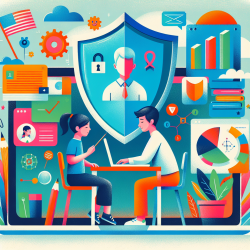Ensuring privacy and confidentiality is paramount in the field of speech-language pathology, particularly when delivering online therapy services to schools. The research article "Privacy and Confidentiality in Emergency Medicine: Obligations and Challenges" by Geiderman, Moskop, and Derse (2006) provides critical insights that can be adapted to enhance the privacy and confidentiality of online therapy sessions.
Key Takeaways from the Research
The research underscores the importance of maintaining privacy and confidentiality, even in high-pressure environments like emergency departments. Several principles can be directly applied to online therapy services:
- Understanding Privacy vs. Confidentiality: Privacy refers to the broader concept of protecting personal space and information, while confidentiality specifically involves the protection of shared personal information. In online therapy, both need to be rigorously protected.
- Legal and Ethical Obligations: Just as emergency physicians must navigate HIPAA regulations, online therapists must ensure compliance with data protection laws such as FERPA and HIPAA.
- Physical and Informational Privacy: The design of virtual spaces should prioritize privacy. This includes secure logins, encrypted communications, and private, uninterrupted spaces for therapy sessions.
Implementing Privacy and Confidentiality in Online Therapy
To effectively implement these principles in online therapy for schools, practitioners should consider the following strategies:
- Secure Platforms: Use platforms that offer end-to-end encryption and comply with relevant privacy laws.
- Training and Awareness: Regular training for therapists on privacy policies and best practices is essential.
- Parental Consent: Ensure that parental consent is obtained and documented for all therapy sessions.
- Confidentiality Agreements: Have clear confidentiality agreements in place that outline the responsibilities of all parties involved.
Challenges and Solutions
The research highlights several challenges to maintaining privacy and confidentiality, which are also relevant to online therapy:
- Balancing Efficiency and Privacy: While it is crucial to be efficient, this should not come at the expense of privacy. Schedule sessions to ensure adequate time for each child without overlapping.
- Unauthorized Access: Prevent unauthorized access by using strong passwords and multi-factor authentication for all accounts.
- Data Breaches: Have a response plan in place for potential data breaches, including immediate notification of affected parties and steps to mitigate the breach.
Conclusion
By incorporating these strategies, online therapy practitioners can enhance the privacy and confidentiality of their services, ultimately creating better outcomes for children. Continuous research and adaptation of best practices are essential to keep up with evolving challenges.To read the original research paper, please follow this link:
Privacy and Confidentiality in Emergency Medicine: Obligations and Challenges.










